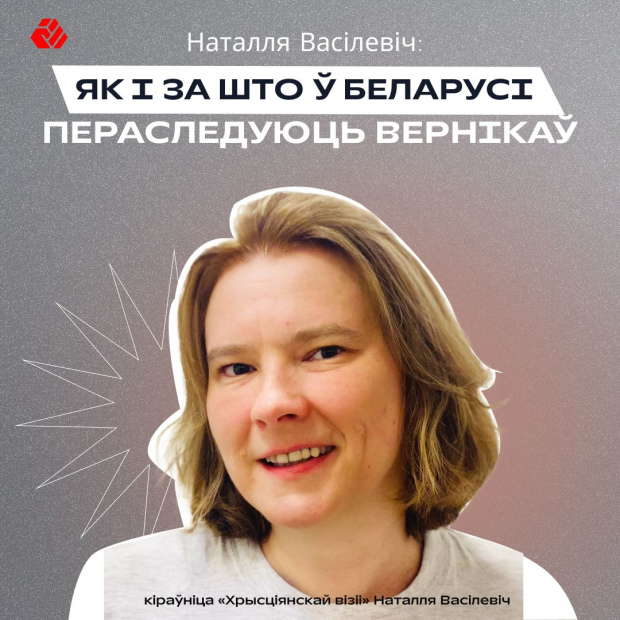How and for what are believers persecuted in Belarus.
After the Nation's Uprising-2020, according to the information of the inter-denominational association of Belarusian believers "Christian Vision", 81 priests were subjected to political persecution in Belarus. Many of them suffered administrative and criminal penalties, some received prison terms, part was pushed into emigration. Believers are persecuted behind bars. It is especially difficult to defend one's right to religion in the imprisonment for political prisoners.
–– Believers and religious organizations are regularly insulted and harassed for their Christian and civil position by officials, state media and pro-government activists. In relation to them, the language of hostility is widely used.
Detainees are subjected to insults, humiliation, and bullying because of their faith or religious affiliation in the so-called repentant videos published on special media resources, which are recorded with the participation of detainees against their will, members of "Christian Vision" says.
The authorities include religious leaders and activists in the "list of extremists" and even "terrorists", which means, among other things, that these people cannot be the founders and heads of religious organizations.
Priest Siarhei Rezanovich was included in the terrorist list. In 2022, the 56-year-old abbot of the Church of St. Michael the Archangel in the agricultural town of Stiapanki, in Brest region, was sentenced to 16 years in prison in the notorious "Autukhovich case." Among the articles on which the priest was tried are "participation in a criminal organization" and "conspiracy to seize state power by unconstitutional ways."
There are known cases when priests lost their posts because of their principledness. Thus, Archbishop Artemiy (Aleksandr Kishchenko, died in April 2023), who after the 2020 elections publicly spoke out against falsifications and violence, was harassed by odious religious figures and was dismissed from his post in 2021.
In 2021, priest Uladzislau Bahamolnikau from the Minsk Diocese was dismissed from the position of philosophy teacher at the Minsk Theological Seminary. Shortly before that Uladzislau announced a hunger strike as a sign of solidarity with jailed journalist Ihar Losik.
In August 2022, Uladzislau Bahamolnikau was brutally detained by GUBOPiK, the priest spent 100 days in the Okrestina detention center, where he contracted the coronavirus. Soon a criminal case was opened against him for "organizing or participating in actions that grossly violate public order." On December 19, 2022, the priest was released with a ban on leaving the country
The list of repressions against priests and believers is endless.
–– In addition to everything, sites, channels and social networks of Belarusian religious figures and communities are systematically recognized as extremist materials. Publications dedicated to the activities of religious organizations are recognized as the same materials. The authorities also limit access to religious materials and resources, including those of a human rights nature, –– says Natallia Vasilevich, head of "Christian Vision".
–– Particularly strong persecution of believers began in 2020 and it relates to two factors, –– Natalya continues. –– The first –– this is an attempt to bring the entire civil society of Belarus, in whatever form it exists, be it public organizations, political parties, business, media, education, medicine, the IT sphere, any independent areas – under the control of the authorities, because they are very stressed by the events of the twentieth year. When they see that there is a community where people build relationships, trust, solidarity –– this is always dangerous for an authoritarian regime. Therefore, significant efforts of the system are aimed at destroying these associations.
The specificity of religious communities is that they are quite large. And if we talk about parishes, religious communities, pilgrimages, congresses, gatherings, conferences and count the number of such movements throughout Belarus, then we get tens, or even hundreds of thousands of active people living their lives, uncontrolled by the state. In the eyes of the authorities, these people can be a very significant mobilizing force.
The second factor is a reaction to the fact that in the peaceful protests of the 20th year, unexpectedly for the authorities, the presence of religious communities was visible. Priests and bishops spoke, and people came out for prayers, there were recordings of various Christian videos. Increasing pressure on the religious community is because the authorities no longer trust it and are trying to somehow "normalize" it, take it under control, identify and punish all those who are disloyal.
As for political prisoners and other prisoners, their oppression on religious grounds concerns five main aspects, says the interlocutor:
–– This is the violent and illegal confiscation of objects of worship, difficulties in obtaining religious literature, difficulties in subscribing to religious publications that are in the official catalog of "Belposhta", serious problems with the organization of pastoral visits for believers in prisons, obstacles to the religious life of convicts, serving terms in colonies, open-type institutions and "home chemistry".
Former political prisoners serving their terms in the Gomel women's colony No. 4 say that the jailers have declared a real war on religion and icons. Among other things, the opportunity to visit the church on the territory of the colony for political prisoners is very limited. The women say that jailers and convicts working for the administration are very careful to ensure that political prisoners did not cross paths with each other during the church service. Some political prisoners are forbidden by the colony administration to visit the temple altogether.
–– The human right to religion is constantly being violated there. They forbade me to visit the church at all, says former political prisoner Alena (the name of the interlocutor has been changed for security reasons). –– Last year, the deputy head of the colony Kavaliou (now Stanislau Kavaliou is the head of colony № 4 –– ed.) ordered to remove church images from all rooms. Prisoners cooperating with the administration very quickly collected all the icons from the common rooms and brought them to the prison church.
Alena adds that jailers constantly ridicule the religious feelings of female political prisoners, often do not allow them to receive relevant literature:
–– One of the militaries said to me: "Listen, you have already committed so many crimes against the state that no prayers will help you anymore. Your straight road is to hell."
The interlocutor mentions the case when the administration of the colony removed from the position a woman from among the convicts, who was taking prisoners to church, because she allowed for political prisoners to meet in the church.
–– She was accused of allowing two politicians to meet in the church. Like, why didn't you watch, why didn't you interrupt their conversation? Jailers see everywhere conspiracies, they are terrified of our cohesion, they see it as a threat. I'm not surprised that people in uniform are so militant against believers and religion in general.
First, everything comes from above: Lukashenka, remember, calls himself an "Orthodox atheist." Well, secondly, there is nothing sacred for this system, its servants trample on morality, fight against spirituality, nobility, humanity, solidarity... That is why the fight against believers, ridiculing their feelings is a continuation of the system's fight against universal values, –– adds former political prisoner.
After the Nation's Uprising-2020, according to the information of the inter-denominational association of Belarusian believers "Christian Vision", 81 priests were subjected to political persecution in Belarus. Many of them suffered administrative and criminal penalties, some received prison terms, part was pushed into emigration. Believers are persecuted behind bars. It is especially difficult to defend one's right to religion in the imprisonment for political prisoners.
"They hunt at all levels, turn priests into terrorists"
–– Believers and religious organizations are regularly insulted and harassed for their Christian and civil position by officials, state media and pro-government activists. In relation to them, the language of hostility is widely used.
Detainees are subjected to insults, humiliation, and bullying because of their faith or religious affiliation in the so-called repentant videos published on special media resources, which are recorded with the participation of detainees against their will, members of "Christian Vision" says.
The authorities include religious leaders and activists in the "list of extremists" and even "terrorists", which means, among other things, that these people cannot be the founders and heads of religious organizations.
Priest Siarhei Rezanovich was included in the terrorist list. In 2022, the 56-year-old abbot of the Church of St. Michael the Archangel in the agricultural town of Stiapanki, in Brest region, was sentenced to 16 years in prison in the notorious "Autukhovich case." Among the articles on which the priest was tried are "participation in a criminal organization" and "conspiracy to seize state power by unconstitutional ways."
There are known cases when priests lost their posts because of their principledness. Thus, Archbishop Artemiy (Aleksandr Kishchenko, died in April 2023), who after the 2020 elections publicly spoke out against falsifications and violence, was harassed by odious religious figures and was dismissed from his post in 2021.
In 2021, priest Uladzislau Bahamolnikau from the Minsk Diocese was dismissed from the position of philosophy teacher at the Minsk Theological Seminary. Shortly before that Uladzislau announced a hunger strike as a sign of solidarity with jailed journalist Ihar Losik.
In August 2022, Uladzislau Bahamolnikau was brutally detained by GUBOPiK, the priest spent 100 days in the Okrestina detention center, where he contracted the coronavirus. Soon a criminal case was opened against him for "organizing or participating in actions that grossly violate public order." On December 19, 2022, the priest was released with a ban on leaving the country
The list of repressions against priests and believers is endless.
–– In addition to everything, sites, channels and social networks of Belarusian religious figures and communities are systematically recognized as extremist materials. Publications dedicated to the activities of religious organizations are recognized as the same materials. The authorities also limit access to religious materials and resources, including those of a human rights nature, –– says Natallia Vasilevich, head of "Christian Vision".
–– Particularly strong persecution of believers began in 2020 and it relates to two factors, –– Natalya continues. –– The first –– this is an attempt to bring the entire civil society of Belarus, in whatever form it exists, be it public organizations, political parties, business, media, education, medicine, the IT sphere, any independent areas – under the control of the authorities, because they are very stressed by the events of the twentieth year. When they see that there is a community where people build relationships, trust, solidarity –– this is always dangerous for an authoritarian regime. Therefore, significant efforts of the system are aimed at destroying these associations.
The specificity of religious communities is that they are quite large. And if we talk about parishes, religious communities, pilgrimages, congresses, gatherings, conferences and count the number of such movements throughout Belarus, then we get tens, or even hundreds of thousands of active people living their lives, uncontrolled by the state. In the eyes of the authorities, these people can be a very significant mobilizing force.
The second factor is a reaction to the fact that in the peaceful protests of the 20th year, unexpectedly for the authorities, the presence of religious communities was visible. Priests and bishops spoke, and people came out for prayers, there were recordings of various Christian videos. Increasing pressure on the religious community is because the authorities no longer trust it and are trying to somehow "normalize" it, take it under control, identify and punish all those who are disloyal.
As for political prisoners and other prisoners, their oppression on religious grounds concerns five main aspects, says the interlocutor:
–– This is the violent and illegal confiscation of objects of worship, difficulties in obtaining religious literature, difficulties in subscribing to religious publications that are in the official catalog of "Belposhta", serious problems with the organization of pastoral visits for believers in prisons, obstacles to the religious life of convicts, serving terms in colonies, open-type institutions and "home chemistry".
Women's colony: even icons are forbidden
Former political prisoners serving their terms in the Gomel women's colony No. 4 say that the jailers have declared a real war on religion and icons. Among other things, the opportunity to visit the church on the territory of the colony for political prisoners is very limited. The women say that jailers and convicts working for the administration are very careful to ensure that political prisoners did not cross paths with each other during the church service. Some political prisoners are forbidden by the colony administration to visit the temple altogether.
–– The human right to religion is constantly being violated there. They forbade me to visit the church at all, says former political prisoner Alena (the name of the interlocutor has been changed for security reasons). –– Last year, the deputy head of the colony Kavaliou (now Stanislau Kavaliou is the head of colony № 4 –– ed.) ordered to remove church images from all rooms. Prisoners cooperating with the administration very quickly collected all the icons from the common rooms and brought them to the prison church.
Alena adds that jailers constantly ridicule the religious feelings of female political prisoners, often do not allow them to receive relevant literature:
–– One of the militaries said to me: "Listen, you have already committed so many crimes against the state that no prayers will help you anymore. Your straight road is to hell."
The interlocutor mentions the case when the administration of the colony removed from the position a woman from among the convicts, who was taking prisoners to church, because she allowed for political prisoners to meet in the church.
–– She was accused of allowing two politicians to meet in the church. Like, why didn't you watch, why didn't you interrupt their conversation? Jailers see everywhere conspiracies, they are terrified of our cohesion, they see it as a threat. I'm not surprised that people in uniform are so militant against believers and religion in general.
First, everything comes from above: Lukashenka, remember, calls himself an "Orthodox atheist." Well, secondly, there is nothing sacred for this system, its servants trample on morality, fight against spirituality, nobility, humanity, solidarity... That is why the fight against believers, ridiculing their feelings is a continuation of the system's fight against universal values, –– adds former political prisoner.


 Continue
Continue
